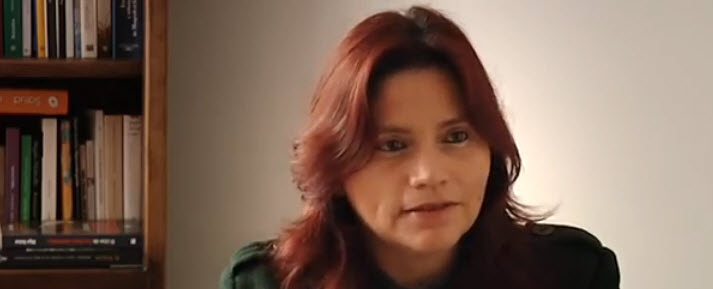It was a time for celebration – after 12 years arrest warrants had been issued for those behind the kidnapping, forced exile, threats and persecution of Colombian journalist Claudia Julieta Duque. After all the suffering Claudia could enjoy the vindication, the small step she had achieved towards winning justice.
But, behind the armour-plated security doors of her flat, boasting locks like Fort Knox, with the TV which doesn’t show films or comedies but instead relays images from the security cameras which survey the inside and outside of her home, the celebrations didn’t last long. Within 24 hours the threats started anew. Claudia was under hostile surveillance. Her daughter was followed and photographed. Claudia’s brother received intimidating phone calls. Today she and her family are once again in fear of their lives.
 For Claudia it has become an all too familiar reality. In 2001 she exposed irregularities in the murder of journalist Jamie Garzon – a killing she says “assassinated free expression in Colombia”. Her investigations pointed to the involvement of the security services in the killing and subsequent cover-up.
For Claudia it has become an all too familiar reality. In 2001 she exposed irregularities in the murder of journalist Jamie Garzon – a killing she says “assassinated free expression in Colombia”. Her investigations pointed to the involvement of the security services in the killing and subsequent cover-up.
For the following seven years she was subjected to systematic intimidation at the hands of Colombia’s security services (DAS) – years of illegal monitoring, surveillance, robberies, interception of emails, physical threats and harassment. She received abusive phone calls threatening the life of her then 11-year old daughter – one caller told her “your daughter is going to suffer, we will burn her alive, we will spread her fingers throughout the house.”.
She later uncovered an instruction manual published by the DAS, setting out in detail how to intimidate and frighten her and to rape her daughter. Claudia was kidnapped in 2001. She has been forced to flee Colombia three times, leaving behind family, friends and colleagues.
But amidst all the terror she has had to endure, Claudia – who was made an honorary member of the NUJ in 2009 – has never given up her struggle for justice. In 2011, Newsweek ranked her as one of the 10 women journalists who most risk their lives for the sake of reporting.
Sitting with her in her apartment in Bogota she refuses to accept she is the story. She is too intent on exposing other human rights abuses. In 23 years as a journalist, she has investigated numerous high-profile cases, covering issues of forced disappearance, the recruitment of children by armed groups, the impact of impunity and the infiltration of paramilitary groups in government agencies.
Her phone rings constantly – she is talking to journalists in exile, campaigning for recompense for the victims of the conflict, organising to defend a threatened journalist. One call informs her a community leader she interviewed just a few days before has been assassinated, paying the ultimate price for speaking truth to power. It puts her off her stride. But only momentarily. Quickly she digs out the tapes of the interview and sets about transcribing it, believing the best response to the murders, threats and abuses is to expose those who behind such atrocities.

That’s what gives her the strength to carry on when many other journalists would, and have, opted for self-censorship or permanent exile. In her own case she never gave up. When she receives the news that arrest warrants have been issued against seven senior security service officers and that for the first time ever in Colombia the charge is to be ‘psychological torture’, she feels a sense of vindication – not just for herself but for her belief in the potential of journalism as a force for good.
Claudia said: “They wanted to silence me but I and my supporters refused to be quiet.
“Even after the warrants were issued they tried to change the prosecutor, but we campaigned and forced them to reinstate them. That is when the threats started again. The fight for justice will be accompanied by new threats but we won’t give up until those responsible for the attacks are sentenced.
“Now it is important action is taken to tackle the threats against all journalists, to compensate the victims and to guarantee the rights of journalists to work free from fear, censorship, intimidation and murder”.
An edited version of this interview with Jeremy Dear was published in the October 2013 edition of The Journalist, the magazine of the British National Union of Journalists.

